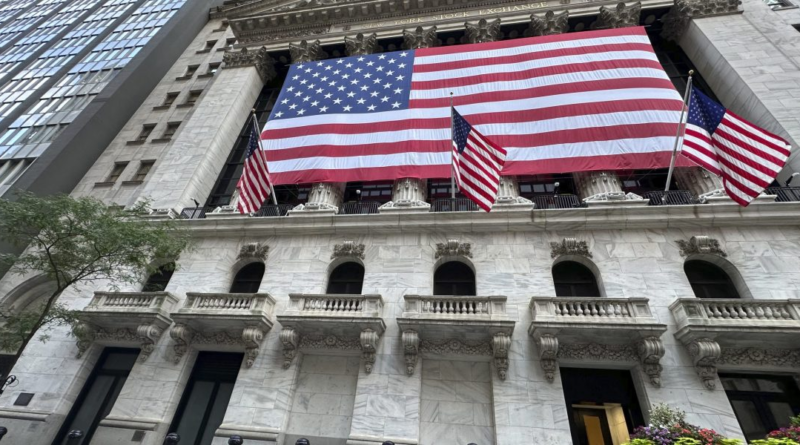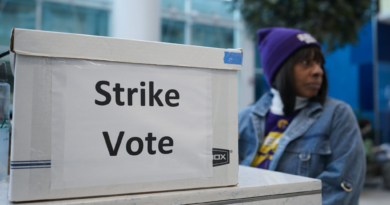Stocks are hovering near their records after the Labor Department delivered another strong jobs report
NEW YORK (AP) — U.S. stocks are sticking near their records Friday following a highly anticipated report on the job market that showed a slowdown in hiring and contained nuggets of data for both optimists and pessimists.
The S&P 500 was virtually unchanged in its first trading after the Fourth of July holiday, following two straight days where it set all-time highs. The Dow Jones Industrial Average was down 94 points, or 0.2%, as of 10:15 a.m. Eastern time, and the Nasdaq composite was adding 0.4% to its own record.
The action was a bit more decisive in the bond market, where Treasury yields sank following the nuanced U.S. jobs report. Employers hired more workers last month than economists expected, but the number was still a slowdown from May’s hiring. Plus, the unemployment rate unexpectedly ticked higher, and the U.S. government said hiring in earlier months was lower than it had previously indicated.
Altogether, the data reinforced belief on Wall Street that the U.S. economy’s growth is slowing under the weight of high interest rates. That’s precisely what investors want to see, because a slowdown would keep a lid on inflation and could push the Federal Reserve to begin cutting its main interest rate.
The question is whether the Federal Reserve can time its next moves precisely, where it lowers rates early and significantly enough to keep the slowdown from sliding into a recession but not so much that it allows inflation to regain strength and take off again.
The clearest takeaway from the jobs report for traders was that it would help push the Fed to cut its main interest rate later this year, likely in September. The two-year Treasury yield, which closely tracks expectations for Fed action, fell to 4.63% from 4.71% late Wednesday.
The yield on the 10-year Treasury, which is the centerpiece of the bond market, fell to 4.31% from 4.36%.
Friday’s jobs report follows a mass of data showing a slowdown across the U.S. economy. Reports earlier this week said business activity in both the U.S. services and manufacturing sectors contracted last month, turning in weaker readings than economists expected. And U.S. shoppers at the lower end of the income spectrum have been showing how difficult it is to keep up with still-rising prices, as balances owed on credit cards swell.
“What matters for long-term investors is whether fears of a recession become a reality,” said Brian Jacobsen, chief economist at Annex Wealth Management. “We think it’s unlikely we’ll see a recession this year or next, but that doesn’t mean the markets won’t fear one.”
On Wall Street, gold miner Newmont rose 1.4% for one of the bigger gains in the S&P 500. It benefited from a 0.7% tick higher for the price of gold, which usually benefits from falling interest rates. That’s because bonds paying high yields can pull investors away from gold, which pays its holders nothing.
Modest gains for some big, influential stocks also helped support the market, even though the majority of stocks within the S&P 500 fell. Apple rose 1.5%, and Microsoft added 1.2%.
Amazon rose 1% after the announcement of a deal where the parent company of Saks Fifth Avenue will buy Neiman Marcus Group for $2.65 billion. Amazon will hold a minority stake in the deal.
On the losing end of Wall Street were companies tied closely to cryptocurrency activity, as bitcoin tumbled below $56,000 from nearly $63,000 early this week. The cryptocurrency’s value is back to where it was in February.
Coinbase Global fell 4.6%, and Robinhood Markets dropped 2.9%.
In stock markets abroad, London’s FTSE 100 fell 0.5% after U.K. voters ushered in a new regime by throwing out Conservatives in this week’s national election.
The United Kingdom experienced a run of turbulent years during Conservative rule that left many voters pessimistic about their country’s future. The U.K.’s exit from the European Union followed by the COVID-19 pandemic and Russia’s invasion of Ukraine battered the economy. Rising poverty and cuts to state services have led to gripes about “Broken Britain.”
Germany’s DAX rose 0.2% after the government agreed on a budget for 2025 and a stimulus package for Europe’s largest economy, ending a monthslong squabble that threatened to upend Chancellor Olaf Scholz’s center-left coalition.
The disagreements had fueled speculation that the already unpopular government could collapse and prompt a snap parliamentary election in which Germany could follow other European countries by swinging toward the political right.
In Asia, Japan’s Nikkei 225 topped 41,000 early Friday to rise above its record closing level set on Thursday, but it ended the day marginally lower.




